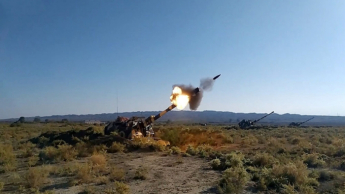Wholly for the Holy Caste

|

Propaganda has always been an important, effective and in some cases lethal component of war machinery.
Propaganda has always been an important, effective and in some cases lethal component of war machinery.
Throughout history, states have used it to tell their side of the story and to counter the intended or perceived consequences of the other side of the story.
The cold war era has strengthened, beyond any bounds, the belief in miraculous powers of propaganda employed creatively, intelligently and continuously to target enemy fault-lines. Hence, the security establishments besides embellishing their guns, refurbishing their tanks, upgrading fighter jets and stockpiling their missiles are also manipulating the media to ensure that their side of the story is told convincingly, covered adequately and heard loudly and clearly, both within and beyond their borders.
The WW1 Wellington House, London has long been demolished but its role, in different forms and manifestations has been assigned to other Houses spread across world capitals. These Houses operating under different names as media houses are modern propaganda bureaus, used voluntarily or involuntarily, consciously or unconsciously, even during peacetime to do what the Wellington House had been doing during the war- safeguarding the interests of “superior” races and “holy” castes.
One example is the report of the EU Disinfo Lab that uncovered a web of fake websites promoting India and maligning Pakistan in the eyes of European public.
The report may be a startling revelation for many. It reveals how in addition to conventional propaganda tactics, modern technologies have also enabled more sophisticated methods. Cyber space is becoming an increasingly attractive launchpad for narratives and counter-narratives as well as for propaganda and lies. Pakistan, however, has been dealing with hostile propaganda since long. Hardly a day passes without Pakistan featuring on the headlines of major news outlets for all the wrong reasons.
Portrayal of Pakistan in the foreign media often reeks of bias and malice borne out of vested or so-called strategic interests. The country is sometimes dubbed a state sponsor of terrorism, called out as an untrustworthy partner or simply singled out for a bad human rights record.
While parroting anti-Pakistan narratives crafted by their political and security establishments, the foreign press conveniently supplants facts with fiction to cast Pakistanis in a bad light.
However, the truth is far removed from the lies proliferated by these media houses.
Pakistan has been in the frontline of the War on Terror since 9/11. It was dragged into a war it never started and never controlled. Consequently, the country suffered immensely from America’s invasion of Afghanistan. In the fight against terrorism, Pakistan has lost more than 80,000 precious lives. People in the tribal areas were uprooted. So many lost their loved ones. The damage to the economy has been colossal.
Yet, Pakistan is the only country in the contemporary world that has successfully dealt with terrorist attacks. Military operations in the tribal areas and improved policing as well as intelligence capabilities have helped to curtail violent attacks and restore peace in the country. Despite challenges, efforts at mainstreaming the tribal areas are underway. The internally displaced persons have returned to their hometowns and villages.
In 2016, Pakistan arrested the Indian terrorist Kulbhushan Jadhav. Commander Jadhav is a serving officer of the Indian Navy. He was responsible for several terrorist attacks inside Pakistan that killed so many innocent civilians.
India’s unprovoked incursion into Pakistani airspace in 2019 could have easily started a war. Yet, it was an unwavering commitment to peace that led Islamabad to release the captured Indian pilot the very next day.
The international establishment, however, refuses to fully acknowledge Pakistan’s achievements in the war on terror and to criticize India’s brinkmanship as well as its sponsoring of cross-border terrorism. Evidently, the profits from Indian markets are large enough to blind these countries with RAW facts (read fictions).
Now as uncertainty prevails in Afghanistan, some sections of the international press are depicting Pakistan as a villain in the Afghan quagmire. Michael Hirsh, a senior correspondent and deputy news editor at Foreign Policy magazine, recently wrote in an article that “Pakistan continues to play the double game that it has long played”.
If Hirsh is trying to hold Pakistan responsible for the failures of US-led forces in Afghanistan, he would do well to tell the world why countries such as Iraq, Syria, and Libya are bleeding even when they don’t share a border with Pakistan.
Moreover, anybody with even the slightest knowledge of Afghanistan’s history, culture and terrain would know very well how difficult it is to control or dictate the Afghans. Expecting Pakistan to prevail over the Taliban-something that even the world’s superpower failed to achieve-is nothing but an exercise in absurdity.
Pakistan for its part is fencing the long border with Afghanistan to prevent cross-border incursions of non-state actors. This is a tedious task and a costly affair. Yet, the government is committed to complete border fencing at the earliest despite the shocking opposition of Afghan government. Ironically, Pakistan’s sincere efforts to prevent cross-border terrorism have mostly gone unnoticed in the mainstream media.
The international media’s partisan approach against Pakistan militates against the goal of regional peace. It only serves the agenda of those who do not wish to see stability and prosperity in South Asia.
Foreign media outlets would indeed serve the cause of regional peace and prosperity should they choose to view Pakistan without a jaundiced eye than to see the country through the lens of its detractors.
The writer is a civil servant. He can be reached at [email protected]
(If you want to contribute and have specific expertise, please contact us at [email protected])
The Rocket and Artillery formations of the Azerbaijan Army conduct live-fire exercises in accordance with the combat training plan for 2021, the Ministry of Defense of Azerbaijan told Baku Tribune.
LAST NEWS






.jpg&h=67&w=67&zc=1&q=100)












